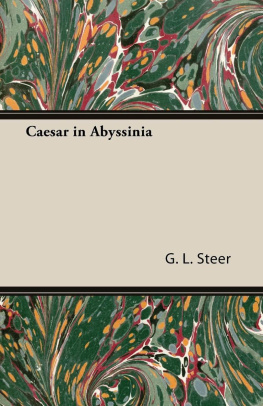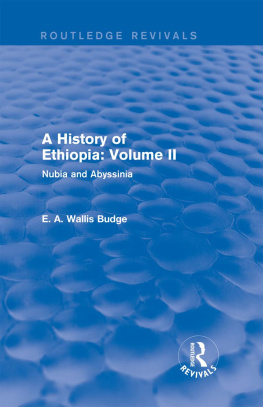INTRODUCTION.
Jeronimo Lobo was born in Lisbon in the year 1593. He entered the Order of the Jesuits at the age of sixteen. After passing through the studies by which Jesuits were trained for missionary work, which included special attention to the arts of speaking and writing, Father Lobo was sent as a missionary to India at the age of twenty-eight, in the year 1621. He reached Goa, as his book tells, in 1622, and was in 1624, at the age of thirty-one, told off as one of the missionaries to be employed in the conversion of the Abyssinians. They were to be converted, from a form of Christianity peculiar to themselves, to orthodox Catholicism. The Abyssinian Emperor Segued was protector of the enterprise, of which we have here the story told.
Father Lobo was nine years in Abyssinia, from the age of thirty-one to the age of forty, and this was the adventurous time of his life. The death of the Emperor Segued put an end to the protection that had given the devoted missionaries, in the midst of dangers, a precarious hold upon their work. When he and his comrades fell into the hands of the Turks at Massowah, his vigour of body and mind, his readiness of resource, and his fidelity, marked him out as the one to be sent to the headquarters in India to secure the payment of a ransom for his companions. He obtained the ransom, and desired also to obtain from the Portuguese Viceroy in India armed force to maintain the missionaries in the position they had so far won. But the Civil power was deaf to his pleading. He removed the appeal to Lisbon, and after narrowly escaping on the way from a shipwreck, and after having been captured by pirates, he reached Lisbon, and sought still to obtain means of overawing the force hostile to the work of the Jesuits in Abyssinia. The Princess Margaret gave friendly hearing, but sent him on to persuade, if he could, the King of Spain; and failing at Madrid, he went to Rome and tried the Pope. He was chosen to go to the Pope, said the Patriarch Alfonso Mendez, because, of all the brethren at Goa, the Pater Hieronymus Lupus (Lobo translated into Wolf) was the most ingenious and learned in all sciences, with a mind most generous in its desire to conquer difficulties, dexterous in management of business, and found most able to make himself agreeable to those with whom there was business to be done. The vigour with which he held by his purpose of endeavouring in every possible way to bring the Christianity of Abyssinia within the pale of the Catholic Church is in accordance with the character that makes the centre of the story of this book. Whimsical touches arise out of this strength of character and readiness of resource, as when he tells of the taste of the Abyssinians for raw cows flesh, with a sauce high in royal Abyssinian favour, made of the cows gall and contents of its entrails, of which, when he was pressed to partake, he could only excuse himself and his brethren by suggesting that it was too good for such humble missionaries. Out of distinguished respect for it, they refrained from putting it into their mouths.
Good Father Lobo gave up the desire of his heart, when it was proved unattainable, and returned to India six years after the breaking up of his work in Abyssinia, at the age of forty-seven. He came to be head of the Provincials of the Jesuit settlement at Goa, and after about ten more years of active duty in the East returned in 1658 to Lisbon, when he died in the religious house of St. Roque in 1678, at the age of eighty-five. A comrade of Father Lobos, Baltazar Tellez, said that Lobo had travelled thirty-eight thousand leagues with no other object before him but the winning of more souls to God. His years in Abyssinia stood out prominently to his mind among all the years of his long life, and he wrote an account of them in Portuguese, of which the manuscript is at Lisbon in the monastery of St. Roque, where he closed his life.
Of that manuscript, then and still unprinted (though use was made of it by Baltazar Tellez in his History of Ethiopia-Coimbra, 1660), the Abbe Legrand, Prior of Neuville-les-Dames, and of Prevessin, published a translation into French. The Abbe Legrand had been to Lisbon as Secretary to the Abbe dEstrees, Ambassador from France to Portugal. The negotiations were so long continued that M. Legrand was detained five years in Lisbon, and employed the time in researches among documents illustrating the Portuguese possessions in India and the East. He obtained many memoirs of great interest, and published from one of them an account of Ceylon; but of all the manuscripts he found none interested him so much as that of Father Lobo. His translation was augmented with illustrative dissertations, letters, and a memoir on the circumstances of the death of M. du Roule. It filled two volumes, or 636 pages of forty lines. This was published in 1728. It was on the 31st of October, 1728, that Samuel Johnson, aged nineteen, went to Pembroke College, Oxford, and Legrands Voyage Historique dAbissinie du R. P. Jerome Lobo, de la Compagnie de Jesus, Traduit du Portugais, continue et augmente de plusieurs Dissertations, Lettres et Memoires, was one of the new books read by Johnson during his short period of college life. In 1735, when Johnsons age was twenty-six, and the world seemed to have shut against him every door of hope, Johnson stayed for six months at Birmingham with his old schoolfellow Hector, who was aiming at medical practice, and who lodged at the house of a bookseller. Johnson spoke with interest of Father Lobo, whose book he had read at Pembroke College. Mr. Warren, the bookseller, thought it would be worth while to print a translation. Hector joined in urging Johnson to undertake it, for a payment of five guineas. Although nearly brought to a stop midway by hypochondriac despondency, a little suggestion that the printers also were stopped, and if they had not their work had not their pay, caused Johnson to go on to the end. Legrands book was reduced to a fifth of its size by the omission of all that overlaid Father Lobos personal account of his adventures; and Johnson began work as a writer with this translation, first published at Birmingham in 1735.
H.M.
THE PREFACE
The following relation is so curious and entertaining, and the dissertations that accompany it so judicious and instructive, that the translator is confident his attempt stands in need of no apology, whatever censures may fall on the performance.
The Portuguese traveller, contrary to the general vein of his countrymen, has amused his reader with no romantic absurdities or incredible fictions; whatever he relates, whether true or not, is at least probable; and he who tells nothing exceeding the bounds of probability has a right to demand that they should believe him who cannot contradict him.
He appears by his modest and unaffected narration to have described things as he saw them, to have copied nature from the life, and to have consulted his senses, not his imagination; he meets with no basilisks that destroy with their eyes, his crocodiles devour their prey without tears, and his cataracts fall from the rock without deafening the neighbouring inhabitants.
The reader will here find no regions cursed with irremediable barrenness, or blessed with spontaneous fecundity, no perpetual gloom or unceasing sunshine; nor are the nations here described either devoid of all sense of humanity, or consummate in all private and social virtues; here are no Hottentots without religion, polity, or articulate language, no Chinese perfectly polite, and completely skilled in all sciences: he will discover, what will always be discovered by a diligent and impartial inquirer, that wherever human nature is to be found there is a mixture of vice and virtue, a contest of passion and reason, and that the Creator doth not appear partial in his distributions, but has balanced in most countries their particular inconveniences by particular favours.








